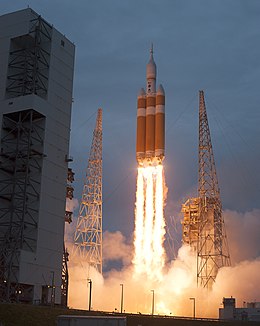Exploration Flight Test 1

Launch of EFT-1 on December 5, 2014
|
|
| Mission type | Uncrewed test flight |
|---|---|
| Operator | NASA |
| COSPAR ID | 2014-077A |
| SATCAT no. | 40329 |
| Mission duration | 4 hours, 24 minutes |
| Orbits completed | 2 |
| Spacecraft properties | |
| Spacecraft type | Orion MPCV |
| Manufacturer | Lockheed Martin |
| Start of mission | |
| Launch date | December 5, 2014, 12:05 UTC (07:05 EST) |
| Rocket | Delta IV Heavy |
| Launch site | Cape Canaveral SLC-37B |
| Contractor | United Launch Alliance |
| End of mission | |
| Recovered by | USS Anchorage |
| Landing date | December 5, 2014, 16:29 UTC |
| Landing site |
Pacific Ocean, 640 miles (1,030 km) SSE of San Diego 23°37′N 114°28′W / 23.61°N 114.46°W |
| Orbital parameters | |
| Reference system | Geocentric |
| Apogee | 5,800 kilometres (3,604 mi) |
|
Orion Program
|
|
Exploration Flight Test 1 or EFT-1 (previously known as Orion Flight Test 1 or OFT-1) was the first test flight of the Orion Multi-Purpose Crew Vehicle. Without a crew, it was launched on December 5, 2014, at 12:05 UTC (7:05 am EST), by a Delta IV Heavy rocket from Space Launch Complex 37B at Cape Canaveral Air Force Station.
The mission was a four-hour, two-orbit test of the Orion crew module featuring a high apogee on the second orbit and concluding with a high-energy reentry at around 20,000 miles per hour (32,000 km/h; 8,900 m/s). This mission design corresponds to the Apollo 4 mission of 1967, which validated the Apollo flight control system and heat shield at re-entry conditions planned for the return from lunar missions.
NASA heavily promoted the mission, collaborating with Sesame Street and its characters to educate children about the flight test and the Orion spacecraft.
The flight was intended to test various Orion systems, including separation events, avionics, heat shielding, parachutes, and recovery operations prior to its debut launch aboard the Space Launch System, currently scheduled for no later than November 2018.
...
Wikipedia

